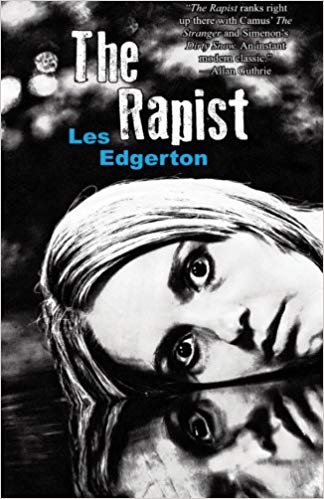 By LES EDGERTON (New Pulp Press; 2013)
By LES EDGERTON (New Pulp Press; 2013)
Here we have a genuine rarity: a truly original entry in a rather hackneyed subgenre. THE RAPIST is so unique, in fact, that I’m finding it difficult to adequately describe. It’s a bit like THE KILLER INSIDE ME crossed with THE STAR ROVER, being a stark crime procedural, a gritty account of prison life (the author, unsurprisingly, is an ex-con) and a near-psychedelic depiction of the whorls of a deranged mind, all contained in an economic 142 pages.
The first person protagonist is one Truman Ferris Pinter, a rapist-murderer reflecting back on his life and crimes from his death row cell. In contrast to the protagonists of most crime novels, Truman is extremely well educated, a Harvard bred snob whose nature is reflected in his often absurdly erudite prose (example: “I had more profitably recalled a sonnet of Andrew Marvell or a scene from Aeschylus, both examples far loftier than grubby, nefarious deprivations of some inconsequential peasants…”).
That Truman is an unreliable narrator is evident early on when he provides two separate accounts of the brutal rape and murder of a young woman that led to his incarceration. He’s trying desperately to convince us (and himself) of his innocence, first by claiming his crime wasn’t “actually” a rape and the woman’s death an accident, and then by questioning the very concept of rape, arguing that rape is instrumental in propagating the species and that other cultures have more aggression-friendly views of sexuality than ours.
Some blunt descriptions of prison life follow, with Truman admitting to being raped by another inmate (“I felt nothing during it other than wishing he’d speed it up”) and breaking a tooth on a piece of gravel mixed in with his food. Truman also engages in a lot of free-form musing about the events of his life, during which he reveals a most intriguing tidbit: that as a child he could fly. Truman claims to have regained that ability, and proves it (in a manner of speaking) when his mind eventually unmoors itself entirely from the here-and-now and enters a subconscious realm where Truman time-trips, speaks with God and witnesses his own death before undergoing a painful self-realization.
Eccentric pulp fiction or avant-garde literature? I’ll leave it up to you to make that distinction for yourself. It won’t take you more than a couple sittings to read this short, shocking and profound novel, but I can guarantee you will be indelibly impacted by the experience.
